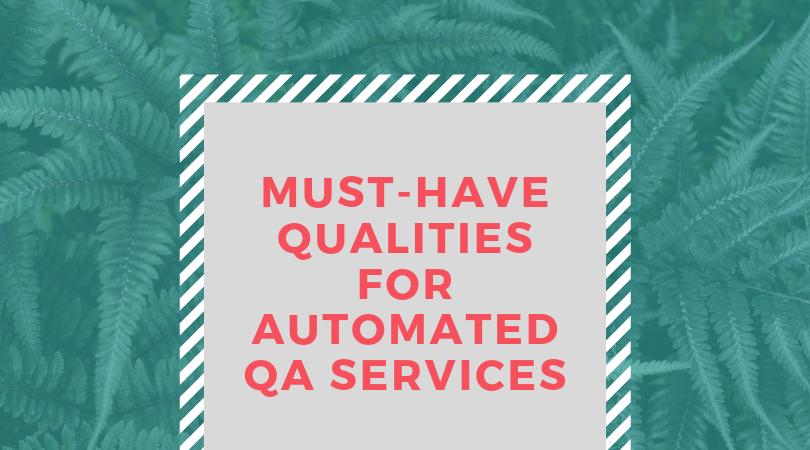Quality Assurance is one of the most important and integral aspects of mobile app design. Effective QA testing on mobile apps lets developers make sure they provide the best experience for their users. Quality assurance requires a lot of repetitive analysis to yield valuable results.
Luckily, it is possible to automate many aspects of quality assurance with software that retrieves large amounts of data from automated testing. This makes a lot of repetitive parts of QA testing easier, more efficient, and much more helpful. Automating parts of the quality assurance process also plays a huge role in controlling quality assurance costs.
Determining the costs of software testing is one of the most important factors in a successful enterprise. Being able to justify the investment of funds used to test, identify, fix, and prevent poor functionality is crucial to effective quality assurance. When comparing costs between automated testing, you can break it down into a few simple criteria to help with the comparison.
To make a good comparison, we will use three pricing criteria for automated testing services. We will be comparing the number of supported platforms for each service, their actual price points, and the scripting languages that they employ. We will take our analysis a little bit more in-depth after looking at these, but these will form the basis of our evaluation.
Before we get into the meat of our analysis, we’re going to review some of the qualities that every good QA service should have. Using these qualities, along with the criteria we’ve identified for comparison, we should be able to get a good cross-section of QA price points.
Must-Have Qualities for Automated QA Services
Automated quality assurance can be very difficult to compare if you have no familiarity with the industry. Although QA can be complex to wrap your head around, it becomes easier once you break down what exactly you are looking for. There are a few basic qualities that users should look for in an automated QA service:
- This means that the service should be able to handle a diverse range of QA tasks. This is stuff like the number of scripting languages supported, the number of supported platforms, and the types of software it is useful for testing.
- The service should be considered in terms of the involvement required to use it. If automated QA requires extensive training or knowledge in order to use, it will change the way it compares to other companies in the same industry.
- This can be measured using metrics like brand popularity, the maturity of the company, and the adaptability of the testing service to new trends and needs. Companies who have proven their professionalism are a much safer bet than newer companies who have yet to learn from any mistakes.
Now, there are a few companies in the industry that easily meet these criteria, and are considered to be effective and popular choices for automated quality assurance. Unified Functional Testing is one example; a paid windows-only service That supports a range of scripting languages and offers a free trial. Another good example would be TestComplete, another paid windows service, which also supports a diverse range of scripting languages.
Both of these services are well-known within the industry, and provide a number of advantages compared to many of their competitors. UFT costs around $3,200 annually, but their services are versatile and effective. TestComplete is a little more pricey, with a mobile QA package coming out to around $5,797 annually.

Re-evaluating The Criteria
There are a few more criteria we can use to refine our comparison and get a more well-rounded idea of how to look at these companies. In addition, there are a few different ways of using criteria such as these to find price points between companies. In order to focus our methods and compare our options, we can try examining the comparison with an expository presentation.
The expository presentation uses a descriptive examination of elements in order to present them to an audience in a structured way. For automated QA services, we encounter this style of information when we research the different companies and what they have to offer. We will be using an expository style to continue comparing a couple of new criteria between different QA services. Surprisingly, this kind of style has various kinds of appliance. For example, it can be used for examining the semantic layout of a page which is similar to a well-defined process analysis essay.
In addition to the platforms, pricing, and scripting languages; we can also look at the ease-of-use and professionalism of the different companies. We touched on these ideas a little bit earlier, but applying them to the comparison is important, as well. Ease-of-use plays a huge role in how much time and effort must be invested to use a service, and professionalism can determine the value of things like customer support and adaptability to trends.
When we include these criteria, we find that TestComplete is more expensive for the same level of functionality. But, it is much easier to use, and shows a higher level of professionalism. Customers might be able to save some money with UFT, but the ease of use, scripting languages, and professionalism make TestComplete very competitive. This shows how a more developed comparison can give you a better idea of what a company has to offer.
Being able to break down your comparisons like this is invaluable to evaluating the price of QA services. Unless we can take a focused look at what companies have to offer, and how well they are able to offer it, we won’t be able to gain a sober evaluation of their prices.
Conclusion
When trying to determine the best price and features for your mobile QA needs, it can be difficult to identify effective characteristics for good price comparisons. There are so many companies that offer automated QA services, and each one has their own unique price setting policies and structures. Being able to take a step back and break down what you’re looking for and what each service has to offer is one of the best ways to accurately and soberly determine an effective price range for your quality assurance.
In the end, there is no singular set of criteria for determining the “best” price. The needs of your specific testing phase will be different from almost every other app and service in the history of quality assurance. When trying to determine a good price for your QA testing, it is important to remember that researching and understanding what each company has to offer is essential.
Since it can be difficult to use a selling price to see how good a QA service is, this article should help you find a good method for evaluating the cost-effectiveness of different QA companies. If you take time to think about the services and the specific needs for your project or company, you will have no trouble evaluating the right price for your QA services. Making sure to always keep your comparisons focused is key.
These criteria can adapt to your own needs and expectations if you think about what your app needs, and what the different companies have to offer. Researching and coming up with your own criteria for comparison can also be an effective way to make sure you’re really getting what you pay for.

